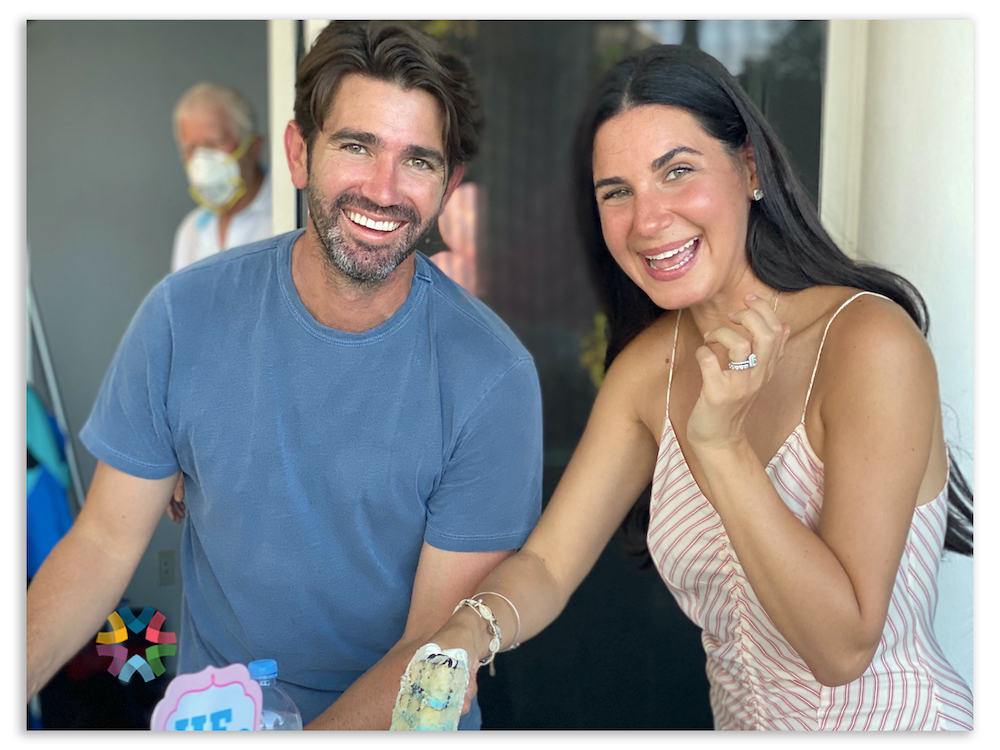
2020 has been a year full of ups and downs for most of us. As this hectic year comes to a close, follow along in Ashley’s journey, as she navigates towards the birth of her first baby. Ashley and her husband are expecting their son this spring, with a little help from their long-distance surrogate! Join us as we discuss the topics you want to talk about; deciding on surrogacy during a pandemic, what it is like to have a long distance surrogate, and how to talk about your infertility struggles with your family and friends during the holidays… And, perhaps most importantly, learning to be there for yourself through life’s hard moments. But before we dive in, let’s get to know Ashley, our mom-to-be!
Tell us about yourself!
My name is Ashley Katzen and I am 33 years old. I live in Miami Beach, FL with my husband of 2 years. I own a Talent Acquisition agency that specializes in hiring, staffing, and recruiting in the fashion industry. In my free time, I focus on giving back to the pancreatic cancer community, as I tragically lost my mother to this disease 9 years ago. Both my husband and I love to travel and explore the world! We are absolutely in love with where we live and look forward to building our family here.
Can you describe your infertility struggle? When did you first find out you would be unable to carry?
At 16 years old I was diagnosed with vaginal agenesis, also known as Mayer-Rokitansky-Kuster-Hauser (MRKH) syndrome. My mother was concerned that I had not gotten my period, so we went to the OB for a checkup. To everyone’s surprise, our doctor noticed that there was an absence of my vaginal canal. We then proceeded with an ultrasound and learned that I did have my eggs, but that my uterus and cervix were missing, as well.
During that time, I had to make a very difficult decision with my mother on whether or not I was going to surgically create a vaginal canal, or choose dilator treatment, which is done independently. I followed my doctor’s recommendation and spent over a year independently using dilators. The main disadvantage is that it required using a dilator 3 times a day (different sizes as I progressed through my journey) for 20 minutes at a time (on a bicycle seat) until eventually, the vaginal canal was stretched to a normal length. I really did not know pain and discomfort until that experience. I also did not understand the magnitude of how difficult it would be – both emotionally and physically – when it came time to have kids. I do, however, remember thinking that nothing would have been worse than that experience.
As I got older and had boyfriends, I had to explain my situation with not being able to get pregnant, and many of them were not too accepting. News also started to get around about my situation in high school, and people doubted my gender and whether or not I was born a female. The struggle was unimaginable at such a young age, but it truly prepared me for IVF and my surrogacy journey.
How did you decide to choose surrogacy… What did you try before, and why was surrogacy the right decision for you?
Knowing that I had viable eggs, it was never not an option for me to have children that were genetically mine. At one point in time I explored the idea of having a uterus transplant, but the success rate was low with a lot of still born babies and, therefore, I always knew that surrogacy was the route I would go.
How did you decide on a surrogacy agency?
I did a lot of research. I called and interviewed many agencies in advance of choosing ConceiveAbilities. There were many factors that weighed in on the decision-making process, for example: fees, support teams, reputation, knowledge, attitude, and organization. After getting to know the team at ConceiveAbilities, and their level of organization, efficiency, attention to detail and structure, I knew that it was the right agency for us.
What have you learned about yourself throughout this journey?
I thought that the most difficult part of this journey for me would be IVF, but I learned VERY quickly that not carrying my own child (while there are many benefits) is by far the hardest part… You feel totally out of control, guilty, separated, disconnected, and negligent. Sometimes, it doesn’t even feel like it’s happening. However, though this journey I learned that it is OK to give up control. I learned to be more patient and understanding. My superstar surrogate taught me how to trust her by really including me every step of the way. Most importantly, I learned that I simply could not expect people to understand what I was going through, especially if they hadn’t gone through it. I became extremely sad and frustrated any time I had expectations of the way I wanted to receive support from people. I eventually learned how to be there for myself. I never thought I could do that. But I can, and I am.
Join our Surrogacy Learning Center to continue the conversation – CLICK HERE TO SIGN UP TODAY! Stay tuned for next week’s installment, where we discuss how this holiday season feels different from years past for Intended Parents, like Ashley!
Do you want to be the surrogate to help someone else grow their family? Or need help starting your own family?